Managing Business Environment: Air New Zealand Analysis Report
VerifiedAdded on 2022/08/22
|11
|3745
|17
Report
AI Summary
This report provides a detailed analysis of the business environment of Air New Zealand, focusing on the impact of political, economic, and legal factors, along with cultural and social challenges. It explores the influence of the Treaty of Waitangi and bicultural partnerships on the airline's operations, planning, and relationships. The report also examines best practices in international business strategies and management techniques relevant to Air New Zealand's global context. Furthermore, it delves into the specific challenges the airline faces due to the influence of the Treaty of Waitangi and proposes solutions to mitigate risks associated with the increasing levels of competition and financial pressures. The report highlights the importance of understanding Maori culture and increasing diversity within the organization to address cultural issues, and it discusses the impact of bicultural partnerships on various aspects of Air New Zealand's business activities. Finally, the report concludes by summarizing the key findings and offering insights into the airline's future prospects within the dynamic New Zealand business landscape.
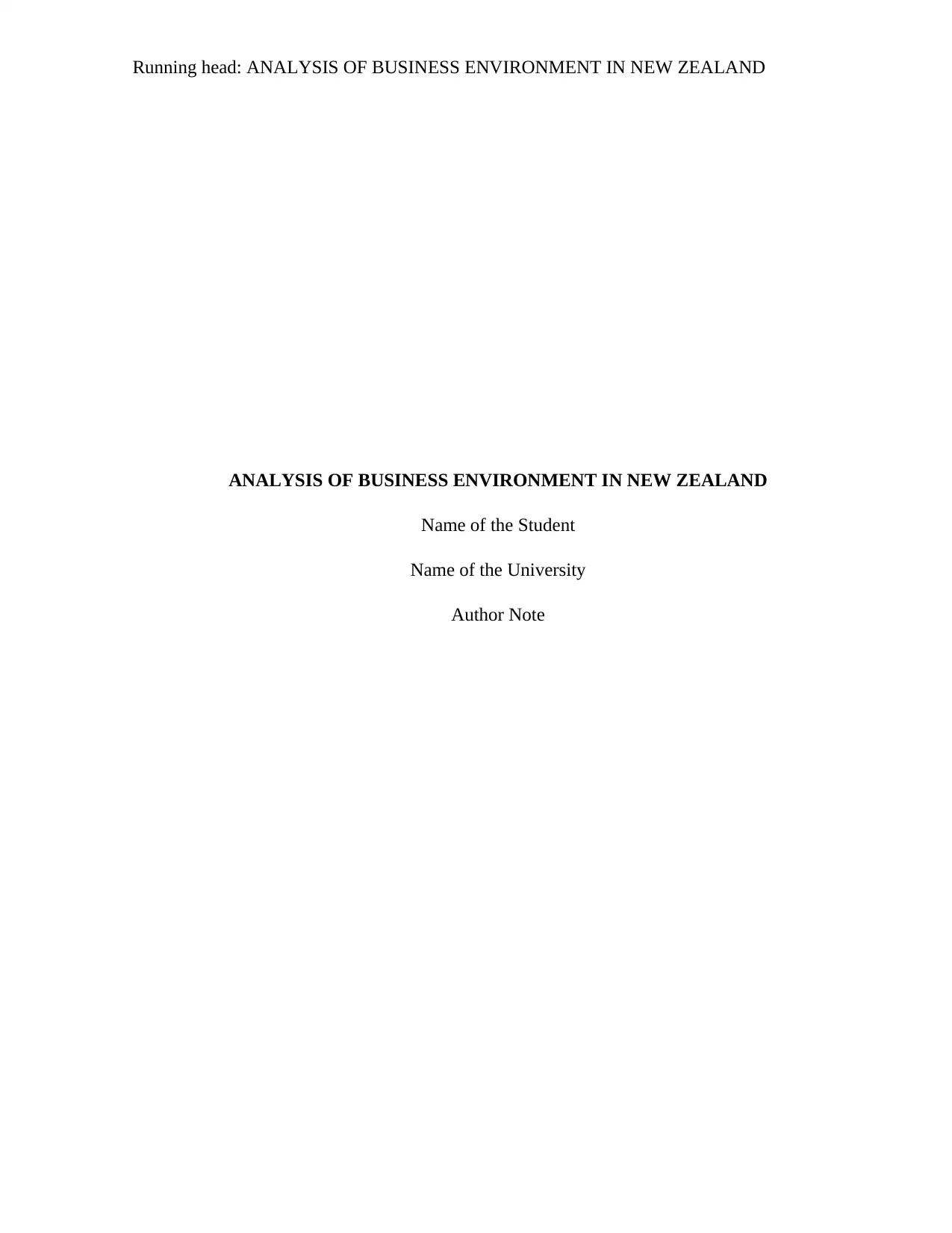
Running head: ANALYSIS OF BUSINESS ENVIRONMENT IN NEW ZEALAND
ANALYSIS OF BUSINESS ENVIRONMENT IN NEW ZEALAND
Name of the Student
Name of the University
Author Note
ANALYSIS OF BUSINESS ENVIRONMENT IN NEW ZEALAND
Name of the Student
Name of the University
Author Note
Paraphrase This Document
Need a fresh take? Get an instant paraphrase of this document with our AI Paraphraser
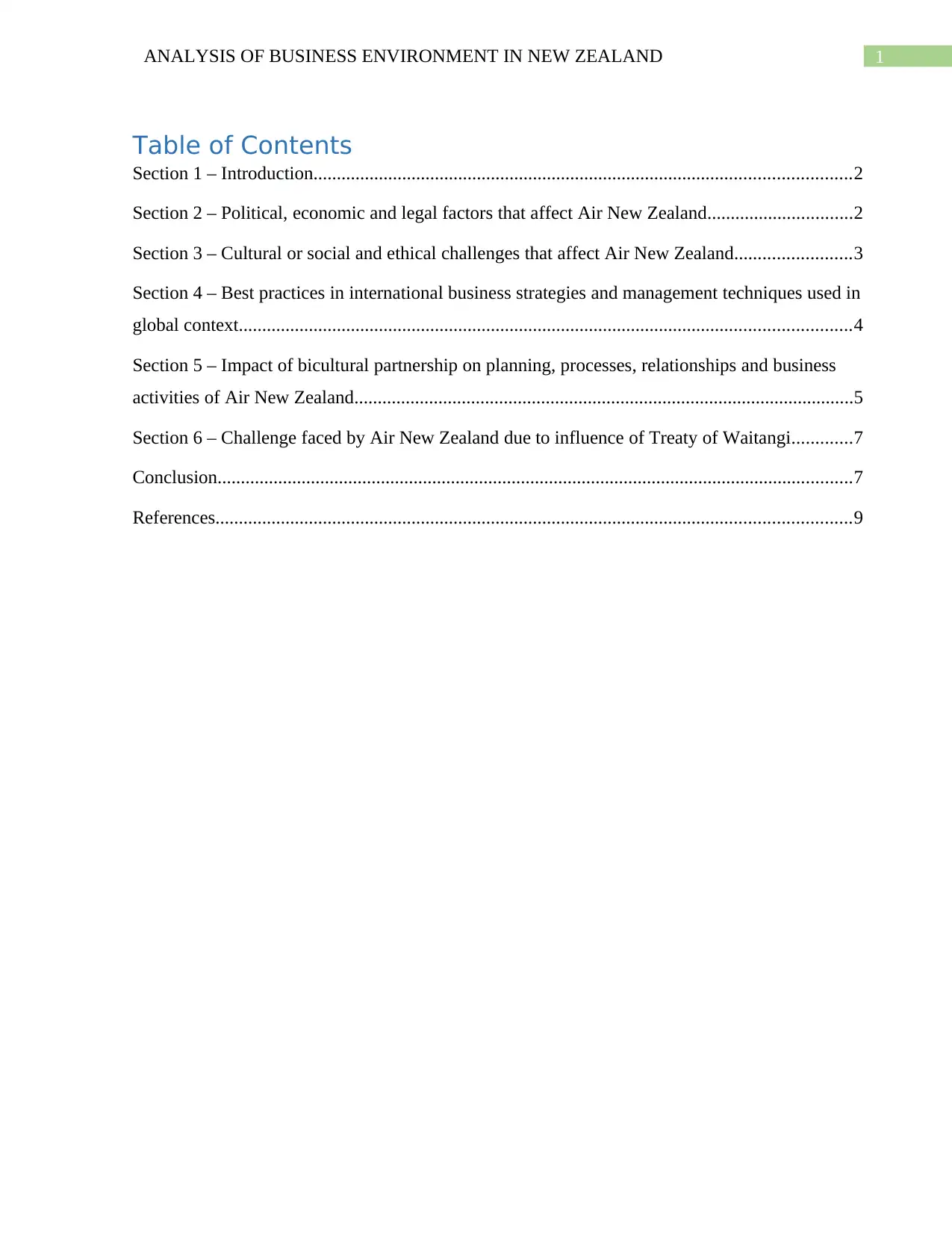
1ANALYSIS OF BUSINESS ENVIRONMENT IN NEW ZEALAND
Table of Contents
Section 1 – Introduction...................................................................................................................2
Section 2 – Political, economic and legal factors that affect Air New Zealand...............................2
Section 3 – Cultural or social and ethical challenges that affect Air New Zealand.........................3
Section 4 – Best practices in international business strategies and management techniques used in
global context...................................................................................................................................4
Section 5 – Impact of bicultural partnership on planning, processes, relationships and business
activities of Air New Zealand...........................................................................................................5
Section 6 – Challenge faced by Air New Zealand due to influence of Treaty of Waitangi.............7
Conclusion........................................................................................................................................7
References........................................................................................................................................9
Table of Contents
Section 1 – Introduction...................................................................................................................2
Section 2 – Political, economic and legal factors that affect Air New Zealand...............................2
Section 3 – Cultural or social and ethical challenges that affect Air New Zealand.........................3
Section 4 – Best practices in international business strategies and management techniques used in
global context...................................................................................................................................4
Section 5 – Impact of bicultural partnership on planning, processes, relationships and business
activities of Air New Zealand...........................................................................................................5
Section 6 – Challenge faced by Air New Zealand due to influence of Treaty of Waitangi.............7
Conclusion........................................................................................................................................7
References........................................................................................................................................9
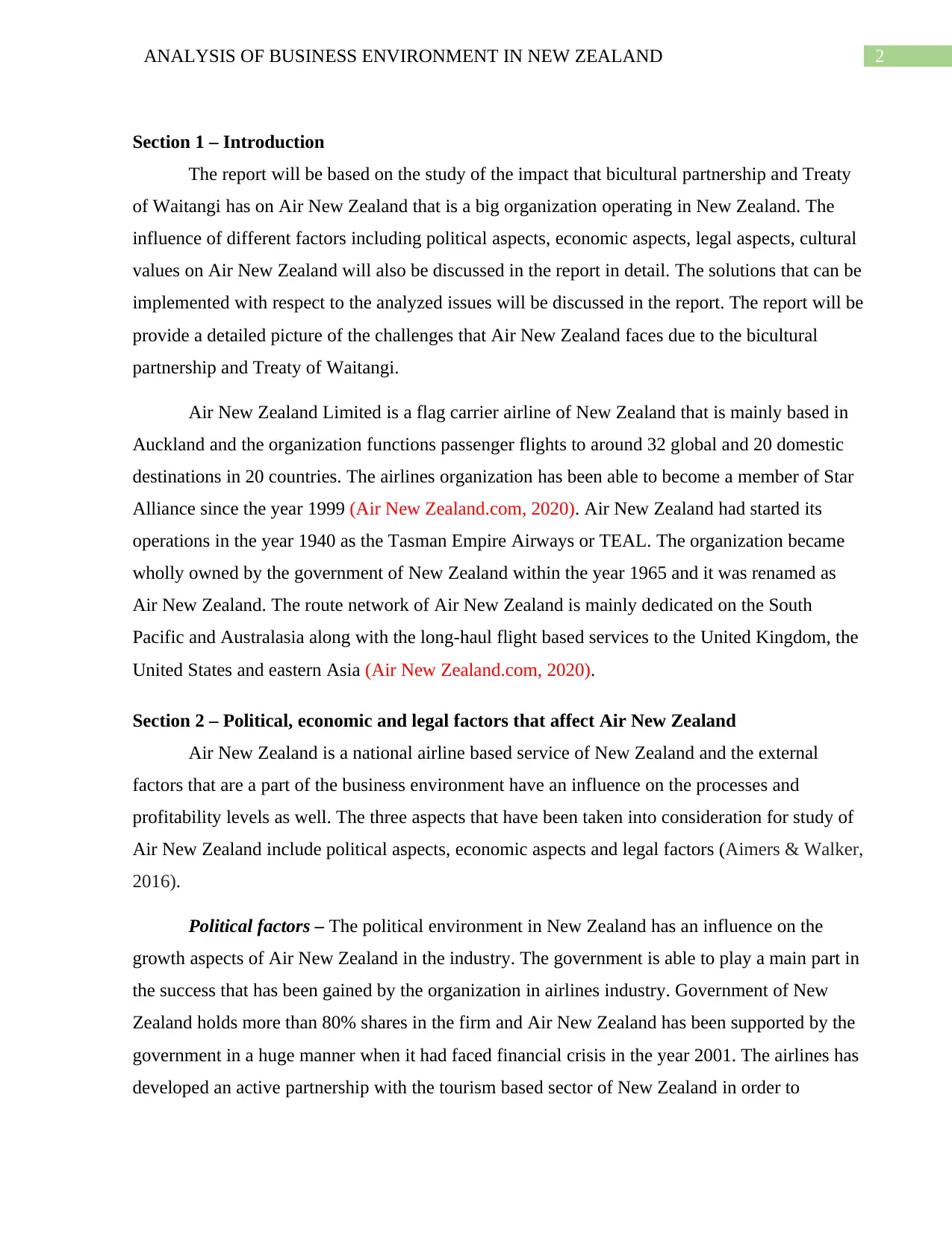
2ANALYSIS OF BUSINESS ENVIRONMENT IN NEW ZEALAND
Section 1 – Introduction
The report will be based on the study of the impact that bicultural partnership and Treaty
of Waitangi has on Air New Zealand that is a big organization operating in New Zealand. The
influence of different factors including political aspects, economic aspects, legal aspects, cultural
values on Air New Zealand will also be discussed in the report in detail. The solutions that can be
implemented with respect to the analyzed issues will be discussed in the report. The report will be
provide a detailed picture of the challenges that Air New Zealand faces due to the bicultural
partnership and Treaty of Waitangi.
Air New Zealand Limited is a flag carrier airline of New Zealand that is mainly based in
Auckland and the organization functions passenger flights to around 32 global and 20 domestic
destinations in 20 countries. The airlines organization has been able to become a member of Star
Alliance since the year 1999 (Air New Zealand.com, 2020). Air New Zealand had started its
operations in the year 1940 as the Tasman Empire Airways or TEAL. The organization became
wholly owned by the government of New Zealand within the year 1965 and it was renamed as
Air New Zealand. The route network of Air New Zealand is mainly dedicated on the South
Pacific and Australasia along with the long-haul flight based services to the United Kingdom, the
United States and eastern Asia (Air New Zealand.com, 2020).
Section 2 – Political, economic and legal factors that affect Air New Zealand
Air New Zealand is a national airline based service of New Zealand and the external
factors that are a part of the business environment have an influence on the processes and
profitability levels as well. The three aspects that have been taken into consideration for study of
Air New Zealand include political aspects, economic aspects and legal factors (Aimers & Walker,
2016).
Political factors – The political environment in New Zealand has an influence on the
growth aspects of Air New Zealand in the industry. The government is able to play a main part in
the success that has been gained by the organization in airlines industry. Government of New
Zealand holds more than 80% shares in the firm and Air New Zealand has been supported by the
government in a huge manner when it had faced financial crisis in the year 2001. The airlines has
developed an active partnership with the tourism based sector of New Zealand in order to
Section 1 – Introduction
The report will be based on the study of the impact that bicultural partnership and Treaty
of Waitangi has on Air New Zealand that is a big organization operating in New Zealand. The
influence of different factors including political aspects, economic aspects, legal aspects, cultural
values on Air New Zealand will also be discussed in the report in detail. The solutions that can be
implemented with respect to the analyzed issues will be discussed in the report. The report will be
provide a detailed picture of the challenges that Air New Zealand faces due to the bicultural
partnership and Treaty of Waitangi.
Air New Zealand Limited is a flag carrier airline of New Zealand that is mainly based in
Auckland and the organization functions passenger flights to around 32 global and 20 domestic
destinations in 20 countries. The airlines organization has been able to become a member of Star
Alliance since the year 1999 (Air New Zealand.com, 2020). Air New Zealand had started its
operations in the year 1940 as the Tasman Empire Airways or TEAL. The organization became
wholly owned by the government of New Zealand within the year 1965 and it was renamed as
Air New Zealand. The route network of Air New Zealand is mainly dedicated on the South
Pacific and Australasia along with the long-haul flight based services to the United Kingdom, the
United States and eastern Asia (Air New Zealand.com, 2020).
Section 2 – Political, economic and legal factors that affect Air New Zealand
Air New Zealand is a national airline based service of New Zealand and the external
factors that are a part of the business environment have an influence on the processes and
profitability levels as well. The three aspects that have been taken into consideration for study of
Air New Zealand include political aspects, economic aspects and legal factors (Aimers & Walker,
2016).
Political factors – The political environment in New Zealand has an influence on the
growth aspects of Air New Zealand in the industry. The government is able to play a main part in
the success that has been gained by the organization in airlines industry. Government of New
Zealand holds more than 80% shares in the firm and Air New Zealand has been supported by the
government in a huge manner when it had faced financial crisis in the year 2001. The airlines has
developed an active partnership with the tourism based sector of New Zealand in order to
⊘ This is a preview!⊘
Do you want full access?
Subscribe today to unlock all pages.

Trusted by 1+ million students worldwide
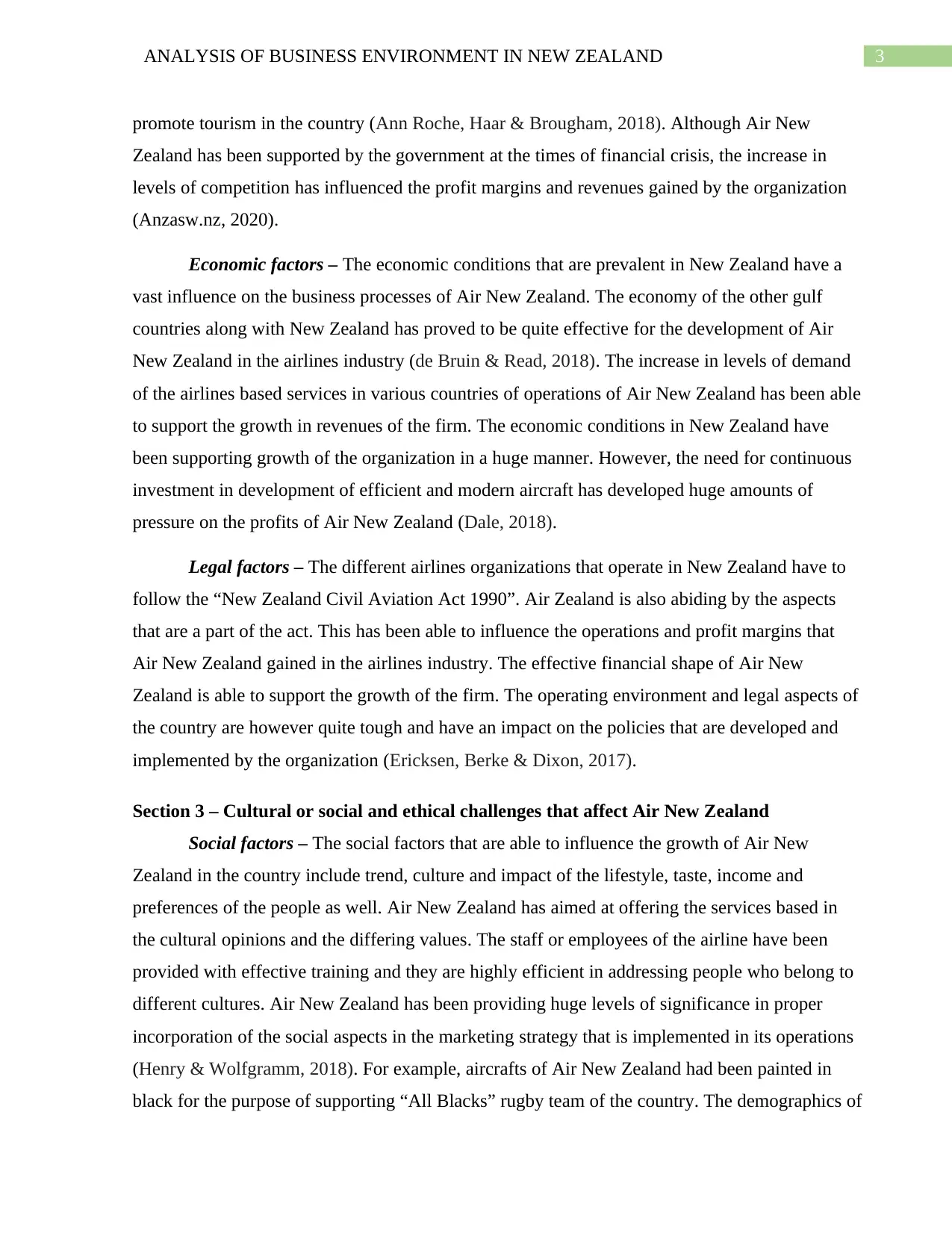
3ANALYSIS OF BUSINESS ENVIRONMENT IN NEW ZEALAND
promote tourism in the country (Ann Roche, Haar & Brougham, 2018). Although Air New
Zealand has been supported by the government at the times of financial crisis, the increase in
levels of competition has influenced the profit margins and revenues gained by the organization
(Anzasw.nz, 2020).
Economic factors – The economic conditions that are prevalent in New Zealand have a
vast influence on the business processes of Air New Zealand. The economy of the other gulf
countries along with New Zealand has proved to be quite effective for the development of Air
New Zealand in the airlines industry (de Bruin & Read, 2018). The increase in levels of demand
of the airlines based services in various countries of operations of Air New Zealand has been able
to support the growth in revenues of the firm. The economic conditions in New Zealand have
been supporting growth of the organization in a huge manner. However, the need for continuous
investment in development of efficient and modern aircraft has developed huge amounts of
pressure on the profits of Air New Zealand (Dale, 2018).
Legal factors – The different airlines organizations that operate in New Zealand have to
follow the “New Zealand Civil Aviation Act 1990”. Air Zealand is also abiding by the aspects
that are a part of the act. This has been able to influence the operations and profit margins that
Air New Zealand gained in the airlines industry. The effective financial shape of Air New
Zealand is able to support the growth of the firm. The operating environment and legal aspects of
the country are however quite tough and have an impact on the policies that are developed and
implemented by the organization (Ericksen, Berke & Dixon, 2017).
Section 3 – Cultural or social and ethical challenges that affect Air New Zealand
Social factors – The social factors that are able to influence the growth of Air New
Zealand in the country include trend, culture and impact of the lifestyle, taste, income and
preferences of the people as well. Air New Zealand has aimed at offering the services based in
the cultural opinions and the differing values. The staff or employees of the airline have been
provided with effective training and they are highly efficient in addressing people who belong to
different cultures. Air New Zealand has been providing huge levels of significance in proper
incorporation of the social aspects in the marketing strategy that is implemented in its operations
(Henry & Wolfgramm, 2018). For example, aircrafts of Air New Zealand had been painted in
black for the purpose of supporting “All Blacks” rugby team of the country. The demographics of
promote tourism in the country (Ann Roche, Haar & Brougham, 2018). Although Air New
Zealand has been supported by the government at the times of financial crisis, the increase in
levels of competition has influenced the profit margins and revenues gained by the organization
(Anzasw.nz, 2020).
Economic factors – The economic conditions that are prevalent in New Zealand have a
vast influence on the business processes of Air New Zealand. The economy of the other gulf
countries along with New Zealand has proved to be quite effective for the development of Air
New Zealand in the airlines industry (de Bruin & Read, 2018). The increase in levels of demand
of the airlines based services in various countries of operations of Air New Zealand has been able
to support the growth in revenues of the firm. The economic conditions in New Zealand have
been supporting growth of the organization in a huge manner. However, the need for continuous
investment in development of efficient and modern aircraft has developed huge amounts of
pressure on the profits of Air New Zealand (Dale, 2018).
Legal factors – The different airlines organizations that operate in New Zealand have to
follow the “New Zealand Civil Aviation Act 1990”. Air Zealand is also abiding by the aspects
that are a part of the act. This has been able to influence the operations and profit margins that
Air New Zealand gained in the airlines industry. The effective financial shape of Air New
Zealand is able to support the growth of the firm. The operating environment and legal aspects of
the country are however quite tough and have an impact on the policies that are developed and
implemented by the organization (Ericksen, Berke & Dixon, 2017).
Section 3 – Cultural or social and ethical challenges that affect Air New Zealand
Social factors – The social factors that are able to influence the growth of Air New
Zealand in the country include trend, culture and impact of the lifestyle, taste, income and
preferences of the people as well. Air New Zealand has aimed at offering the services based in
the cultural opinions and the differing values. The staff or employees of the airline have been
provided with effective training and they are highly efficient in addressing people who belong to
different cultures. Air New Zealand has been providing huge levels of significance in proper
incorporation of the social aspects in the marketing strategy that is implemented in its operations
(Henry & Wolfgramm, 2018). For example, aircrafts of Air New Zealand had been painted in
black for the purpose of supporting “All Blacks” rugby team of the country. The demographics of
Paraphrase This Document
Need a fresh take? Get an instant paraphrase of this document with our AI Paraphraser
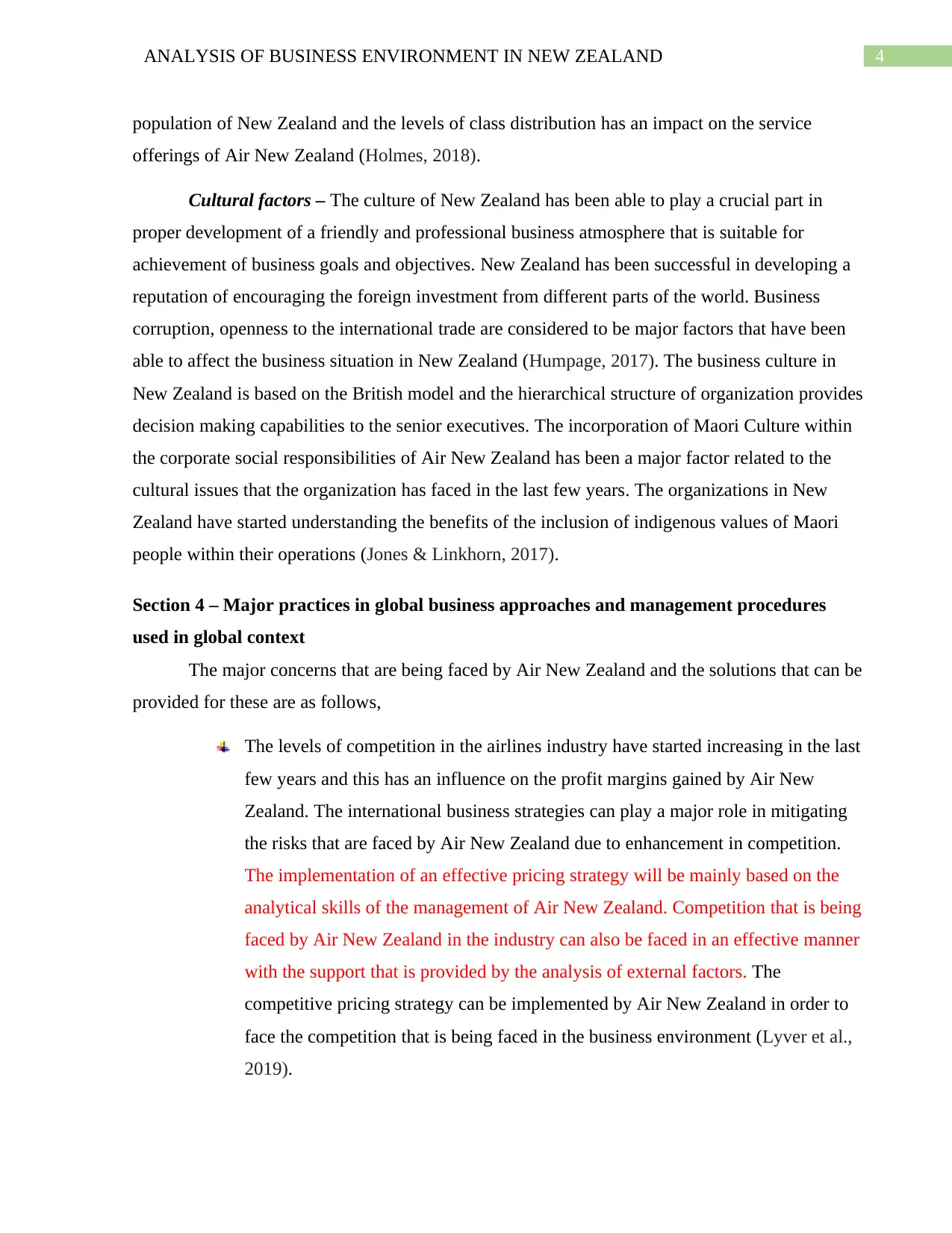
4ANALYSIS OF BUSINESS ENVIRONMENT IN NEW ZEALAND
population of New Zealand and the levels of class distribution has an impact on the service
offerings of Air New Zealand (Holmes, 2018).
Cultural factors – The culture of New Zealand has been able to play a crucial part in
proper development of a friendly and professional business atmosphere that is suitable for
achievement of business goals and objectives. New Zealand has been successful in developing a
reputation of encouraging the foreign investment from different parts of the world. Business
corruption, openness to the international trade are considered to be major factors that have been
able to affect the business situation in New Zealand (Humpage, 2017). The business culture in
New Zealand is based on the British model and the hierarchical structure of organization provides
decision making capabilities to the senior executives. The incorporation of Maori Culture within
the corporate social responsibilities of Air New Zealand has been a major factor related to the
cultural issues that the organization has faced in the last few years. The organizations in New
Zealand have started understanding the benefits of the inclusion of indigenous values of Maori
people within their operations (Jones & Linkhorn, 2017).
Section 4 – Major practices in global business approaches and management procedures
used in global context
The major concerns that are being faced by Air New Zealand and the solutions that can be
provided for these are as follows,
The levels of competition in the airlines industry have started increasing in the last
few years and this has an influence on the profit margins gained by Air New
Zealand. The international business strategies can play a major role in mitigating
the risks that are faced by Air New Zealand due to enhancement in competition.
The implementation of an effective pricing strategy will be mainly based on the
analytical skills of the management of Air New Zealand. Competition that is being
faced by Air New Zealand in the industry can also be faced in an effective manner
with the support that is provided by the analysis of external factors. The
competitive pricing strategy can be implemented by Air New Zealand in order to
face the competition that is being faced in the business environment (Lyver et al.,
2019).
population of New Zealand and the levels of class distribution has an impact on the service
offerings of Air New Zealand (Holmes, 2018).
Cultural factors – The culture of New Zealand has been able to play a crucial part in
proper development of a friendly and professional business atmosphere that is suitable for
achievement of business goals and objectives. New Zealand has been successful in developing a
reputation of encouraging the foreign investment from different parts of the world. Business
corruption, openness to the international trade are considered to be major factors that have been
able to affect the business situation in New Zealand (Humpage, 2017). The business culture in
New Zealand is based on the British model and the hierarchical structure of organization provides
decision making capabilities to the senior executives. The incorporation of Maori Culture within
the corporate social responsibilities of Air New Zealand has been a major factor related to the
cultural issues that the organization has faced in the last few years. The organizations in New
Zealand have started understanding the benefits of the inclusion of indigenous values of Maori
people within their operations (Jones & Linkhorn, 2017).
Section 4 – Major practices in global business approaches and management procedures
used in global context
The major concerns that are being faced by Air New Zealand and the solutions that can be
provided for these are as follows,
The levels of competition in the airlines industry have started increasing in the last
few years and this has an influence on the profit margins gained by Air New
Zealand. The international business strategies can play a major role in mitigating
the risks that are faced by Air New Zealand due to enhancement in competition.
The implementation of an effective pricing strategy will be mainly based on the
analytical skills of the management of Air New Zealand. Competition that is being
faced by Air New Zealand in the industry can also be faced in an effective manner
with the support that is provided by the analysis of external factors. The
competitive pricing strategy can be implemented by Air New Zealand in order to
face the competition that is being faced in the business environment (Lyver et al.,
2019).
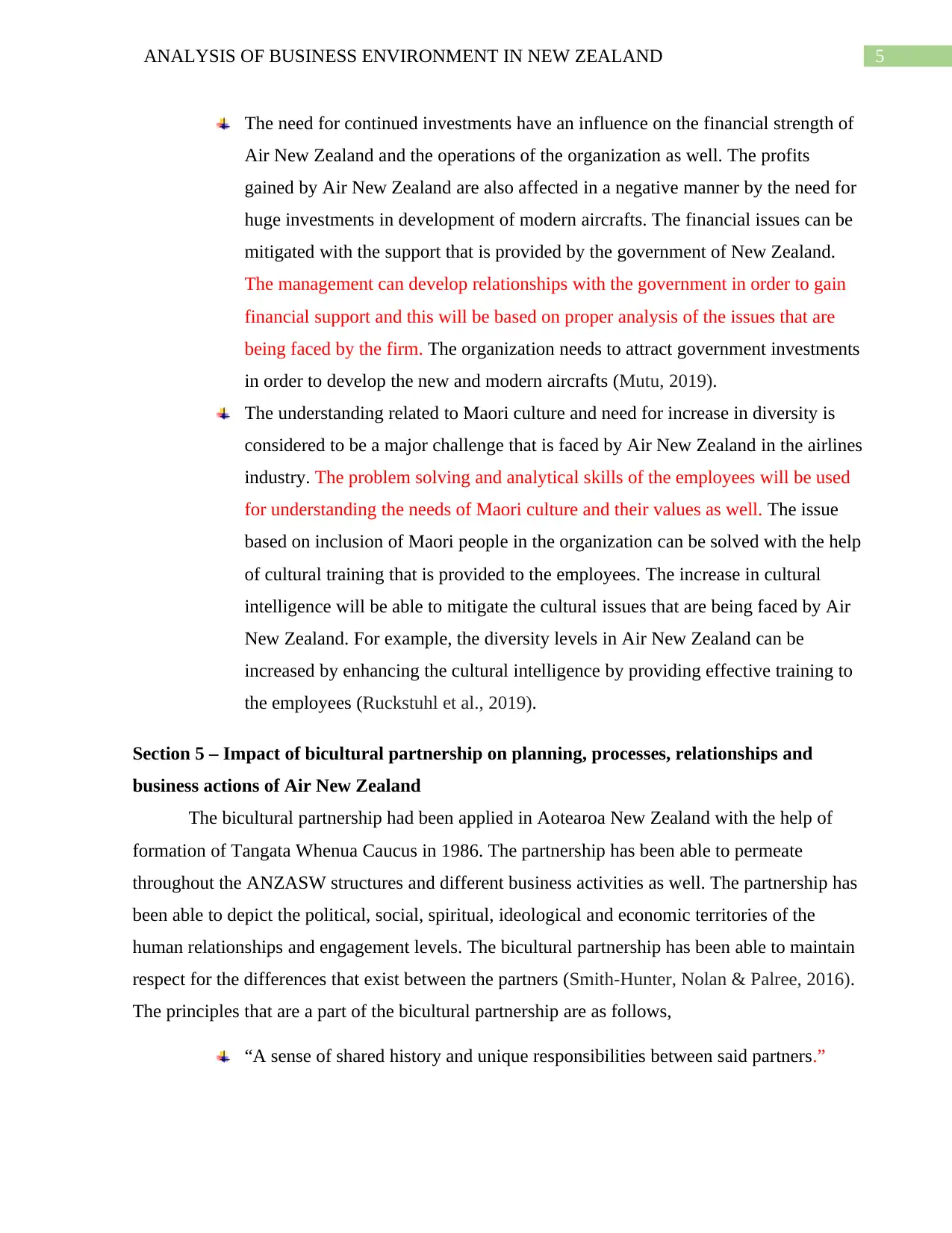
5ANALYSIS OF BUSINESS ENVIRONMENT IN NEW ZEALAND
The need for continued investments have an influence on the financial strength of
Air New Zealand and the operations of the organization as well. The profits
gained by Air New Zealand are also affected in a negative manner by the need for
huge investments in development of modern aircrafts. The financial issues can be
mitigated with the support that is provided by the government of New Zealand.
The management can develop relationships with the government in order to gain
financial support and this will be based on proper analysis of the issues that are
being faced by the firm. The organization needs to attract government investments
in order to develop the new and modern aircrafts (Mutu, 2019).
The understanding related to Maori culture and need for increase in diversity is
considered to be a major challenge that is faced by Air New Zealand in the airlines
industry. The problem solving and analytical skills of the employees will be used
for understanding the needs of Maori culture and their values as well. The issue
based on inclusion of Maori people in the organization can be solved with the help
of cultural training that is provided to the employees. The increase in cultural
intelligence will be able to mitigate the cultural issues that are being faced by Air
New Zealand. For example, the diversity levels in Air New Zealand can be
increased by enhancing the cultural intelligence by providing effective training to
the employees (Ruckstuhl et al., 2019).
Section 5 – Impact of bicultural partnership on planning, processes, relationships and
business actions of Air New Zealand
The bicultural partnership had been applied in Aotearoa New Zealand with the help of
formation of Tangata Whenua Caucus in 1986. The partnership has been able to permeate
throughout the ANZASW structures and different business activities as well. The partnership has
been able to depict the political, social, spiritual, ideological and economic territories of the
human relationships and engagement levels. The bicultural partnership has been able to maintain
respect for the differences that exist between the partners (Smith-Hunter, Nolan & Palree, 2016).
The principles that are a part of the bicultural partnership are as follows,
“A sense of shared history and unique responsibilities between said partners.”
The need for continued investments have an influence on the financial strength of
Air New Zealand and the operations of the organization as well. The profits
gained by Air New Zealand are also affected in a negative manner by the need for
huge investments in development of modern aircrafts. The financial issues can be
mitigated with the support that is provided by the government of New Zealand.
The management can develop relationships with the government in order to gain
financial support and this will be based on proper analysis of the issues that are
being faced by the firm. The organization needs to attract government investments
in order to develop the new and modern aircrafts (Mutu, 2019).
The understanding related to Maori culture and need for increase in diversity is
considered to be a major challenge that is faced by Air New Zealand in the airlines
industry. The problem solving and analytical skills of the employees will be used
for understanding the needs of Maori culture and their values as well. The issue
based on inclusion of Maori people in the organization can be solved with the help
of cultural training that is provided to the employees. The increase in cultural
intelligence will be able to mitigate the cultural issues that are being faced by Air
New Zealand. For example, the diversity levels in Air New Zealand can be
increased by enhancing the cultural intelligence by providing effective training to
the employees (Ruckstuhl et al., 2019).
Section 5 – Impact of bicultural partnership on planning, processes, relationships and
business actions of Air New Zealand
The bicultural partnership had been applied in Aotearoa New Zealand with the help of
formation of Tangata Whenua Caucus in 1986. The partnership has been able to permeate
throughout the ANZASW structures and different business activities as well. The partnership has
been able to depict the political, social, spiritual, ideological and economic territories of the
human relationships and engagement levels. The bicultural partnership has been able to maintain
respect for the differences that exist between the partners (Smith-Hunter, Nolan & Palree, 2016).
The principles that are a part of the bicultural partnership are as follows,
“A sense of shared history and unique responsibilities between said partners.”
⊘ This is a preview!⊘
Do you want full access?
Subscribe today to unlock all pages.

Trusted by 1+ million students worldwide
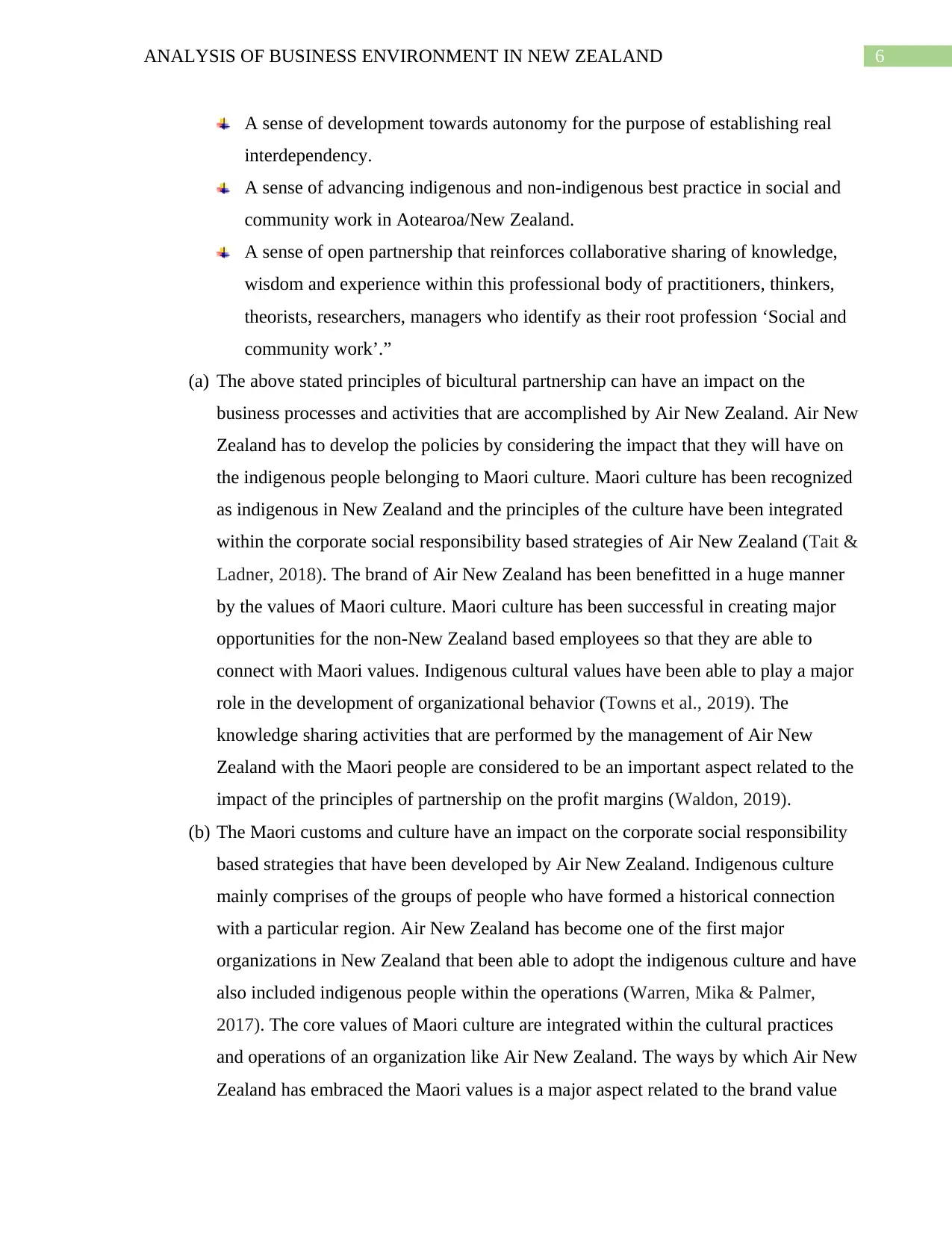
6ANALYSIS OF BUSINESS ENVIRONMENT IN NEW ZEALAND
A sense of development towards autonomy for the purpose of establishing real
interdependency.
A sense of advancing indigenous and non-indigenous best practice in social and
community work in Aotearoa/New Zealand.
A sense of open partnership that reinforces collaborative sharing of knowledge,
wisdom and experience within this professional body of practitioners, thinkers,
theorists, researchers, managers who identify as their root profession ‘Social and
community work’.”
(a) The above stated principles of bicultural partnership can have an impact on the
business processes and activities that are accomplished by Air New Zealand. Air New
Zealand has to develop the policies by considering the impact that they will have on
the indigenous people belonging to Maori culture. Maori culture has been recognized
as indigenous in New Zealand and the principles of the culture have been integrated
within the corporate social responsibility based strategies of Air New Zealand (Tait &
Ladner, 2018). The brand of Air New Zealand has been benefitted in a huge manner
by the values of Maori culture. Maori culture has been successful in creating major
opportunities for the non-New Zealand based employees so that they are able to
connect with Maori values. Indigenous cultural values have been able to play a major
role in the development of organizational behavior (Towns et al., 2019). The
knowledge sharing activities that are performed by the management of Air New
Zealand with the Maori people are considered to be an important aspect related to the
impact of the principles of partnership on the profit margins (Waldon, 2019).
(b) The Maori customs and culture have an impact on the corporate social responsibility
based strategies that have been developed by Air New Zealand. Indigenous culture
mainly comprises of the groups of people who have formed a historical connection
with a particular region. Air New Zealand has become one of the first major
organizations in New Zealand that been able to adopt the indigenous culture and have
also included indigenous people within the operations (Warren, Mika & Palmer,
2017). The core values of Maori culture are integrated within the cultural practices
and operations of an organization like Air New Zealand. The ways by which Air New
Zealand has embraced the Maori values is a major aspect related to the brand value
A sense of development towards autonomy for the purpose of establishing real
interdependency.
A sense of advancing indigenous and non-indigenous best practice in social and
community work in Aotearoa/New Zealand.
A sense of open partnership that reinforces collaborative sharing of knowledge,
wisdom and experience within this professional body of practitioners, thinkers,
theorists, researchers, managers who identify as their root profession ‘Social and
community work’.”
(a) The above stated principles of bicultural partnership can have an impact on the
business processes and activities that are accomplished by Air New Zealand. Air New
Zealand has to develop the policies by considering the impact that they will have on
the indigenous people belonging to Maori culture. Maori culture has been recognized
as indigenous in New Zealand and the principles of the culture have been integrated
within the corporate social responsibility based strategies of Air New Zealand (Tait &
Ladner, 2018). The brand of Air New Zealand has been benefitted in a huge manner
by the values of Maori culture. Maori culture has been successful in creating major
opportunities for the non-New Zealand based employees so that they are able to
connect with Maori values. Indigenous cultural values have been able to play a major
role in the development of organizational behavior (Towns et al., 2019). The
knowledge sharing activities that are performed by the management of Air New
Zealand with the Maori people are considered to be an important aspect related to the
impact of the principles of partnership on the profit margins (Waldon, 2019).
(b) The Maori customs and culture have an impact on the corporate social responsibility
based strategies that have been developed by Air New Zealand. Indigenous culture
mainly comprises of the groups of people who have formed a historical connection
with a particular region. Air New Zealand has become one of the first major
organizations in New Zealand that been able to adopt the indigenous culture and have
also included indigenous people within the operations (Warren, Mika & Palmer,
2017). The core values of Maori culture are integrated within the cultural practices
and operations of an organization like Air New Zealand. The ways by which Air New
Zealand has embraced the Maori values is a major aspect related to the brand value
Paraphrase This Document
Need a fresh take? Get an instant paraphrase of this document with our AI Paraphraser
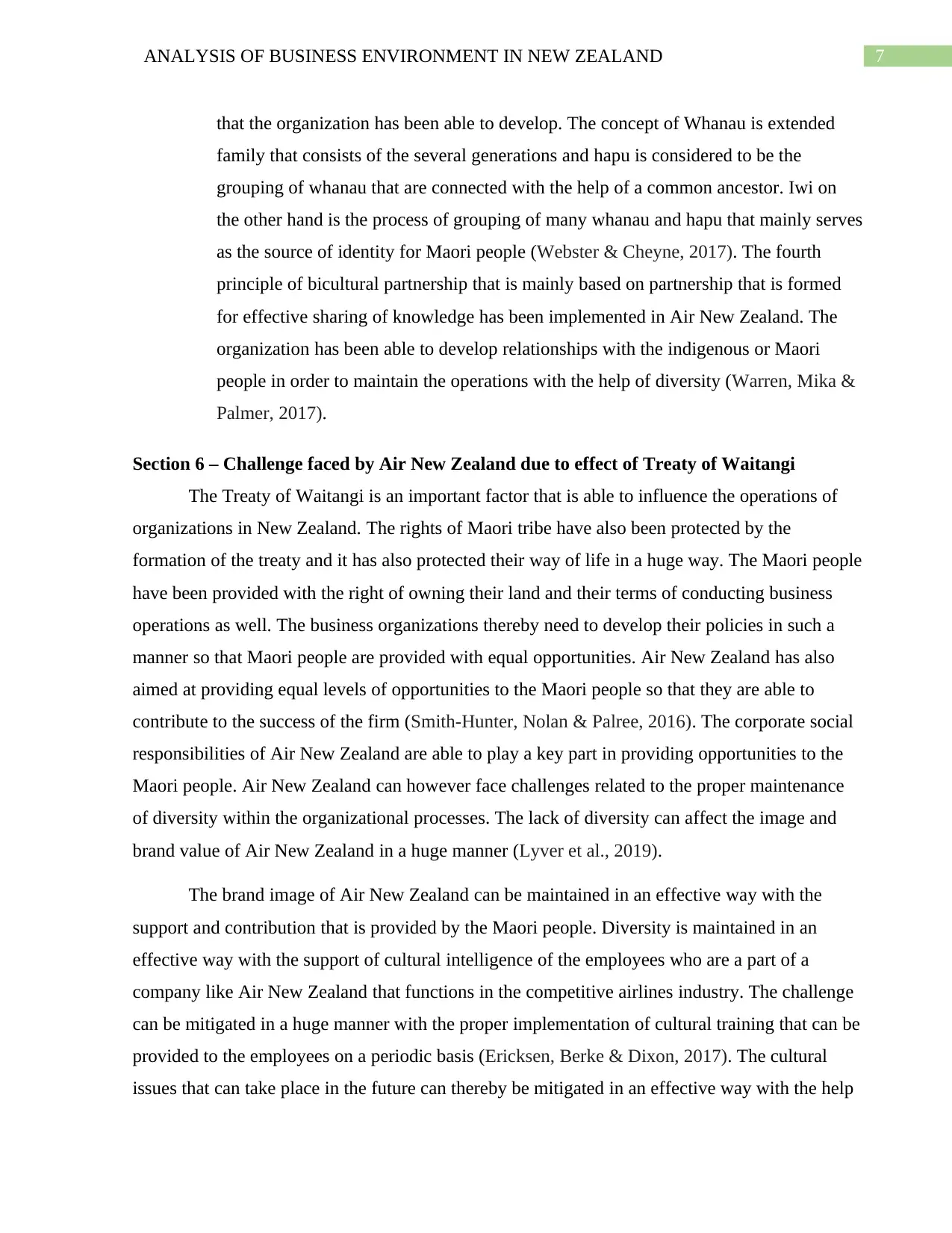
7ANALYSIS OF BUSINESS ENVIRONMENT IN NEW ZEALAND
that the organization has been able to develop. The concept of Whanau is extended
family that consists of the several generations and hapu is considered to be the
grouping of whanau that are connected with the help of a common ancestor. Iwi on
the other hand is the process of grouping of many whanau and hapu that mainly serves
as the source of identity for Maori people (Webster & Cheyne, 2017). The fourth
principle of bicultural partnership that is mainly based on partnership that is formed
for effective sharing of knowledge has been implemented in Air New Zealand. The
organization has been able to develop relationships with the indigenous or Maori
people in order to maintain the operations with the help of diversity (Warren, Mika &
Palmer, 2017).
Section 6 – Challenge faced by Air New Zealand due to effect of Treaty of Waitangi
The Treaty of Waitangi is an important factor that is able to influence the operations of
organizations in New Zealand. The rights of Maori tribe have also been protected by the
formation of the treaty and it has also protected their way of life in a huge way. The Maori people
have been provided with the right of owning their land and their terms of conducting business
operations as well. The business organizations thereby need to develop their policies in such a
manner so that Maori people are provided with equal opportunities. Air New Zealand has also
aimed at providing equal levels of opportunities to the Maori people so that they are able to
contribute to the success of the firm (Smith-Hunter, Nolan & Palree, 2016). The corporate social
responsibilities of Air New Zealand are able to play a key part in providing opportunities to the
Maori people. Air New Zealand can however face challenges related to the proper maintenance
of diversity within the organizational processes. The lack of diversity can affect the image and
brand value of Air New Zealand in a huge manner (Lyver et al., 2019).
The brand image of Air New Zealand can be maintained in an effective way with the
support and contribution that is provided by the Maori people. Diversity is maintained in an
effective way with the support of cultural intelligence of the employees who are a part of a
company like Air New Zealand that functions in the competitive airlines industry. The challenge
can be mitigated in a huge manner with the proper implementation of cultural training that can be
provided to the employees on a periodic basis (Ericksen, Berke & Dixon, 2017). The cultural
issues that can take place in the future can thereby be mitigated in an effective way with the help
that the organization has been able to develop. The concept of Whanau is extended
family that consists of the several generations and hapu is considered to be the
grouping of whanau that are connected with the help of a common ancestor. Iwi on
the other hand is the process of grouping of many whanau and hapu that mainly serves
as the source of identity for Maori people (Webster & Cheyne, 2017). The fourth
principle of bicultural partnership that is mainly based on partnership that is formed
for effective sharing of knowledge has been implemented in Air New Zealand. The
organization has been able to develop relationships with the indigenous or Maori
people in order to maintain the operations with the help of diversity (Warren, Mika &
Palmer, 2017).
Section 6 – Challenge faced by Air New Zealand due to effect of Treaty of Waitangi
The Treaty of Waitangi is an important factor that is able to influence the operations of
organizations in New Zealand. The rights of Maori tribe have also been protected by the
formation of the treaty and it has also protected their way of life in a huge way. The Maori people
have been provided with the right of owning their land and their terms of conducting business
operations as well. The business organizations thereby need to develop their policies in such a
manner so that Maori people are provided with equal opportunities. Air New Zealand has also
aimed at providing equal levels of opportunities to the Maori people so that they are able to
contribute to the success of the firm (Smith-Hunter, Nolan & Palree, 2016). The corporate social
responsibilities of Air New Zealand are able to play a key part in providing opportunities to the
Maori people. Air New Zealand can however face challenges related to the proper maintenance
of diversity within the organizational processes. The lack of diversity can affect the image and
brand value of Air New Zealand in a huge manner (Lyver et al., 2019).
The brand image of Air New Zealand can be maintained in an effective way with the
support and contribution that is provided by the Maori people. Diversity is maintained in an
effective way with the support of cultural intelligence of the employees who are a part of a
company like Air New Zealand that functions in the competitive airlines industry. The challenge
can be mitigated in a huge manner with the proper implementation of cultural training that can be
provided to the employees on a periodic basis (Ericksen, Berke & Dixon, 2017). The cultural
issues that can take place in the future can thereby be mitigated in an effective way with the help
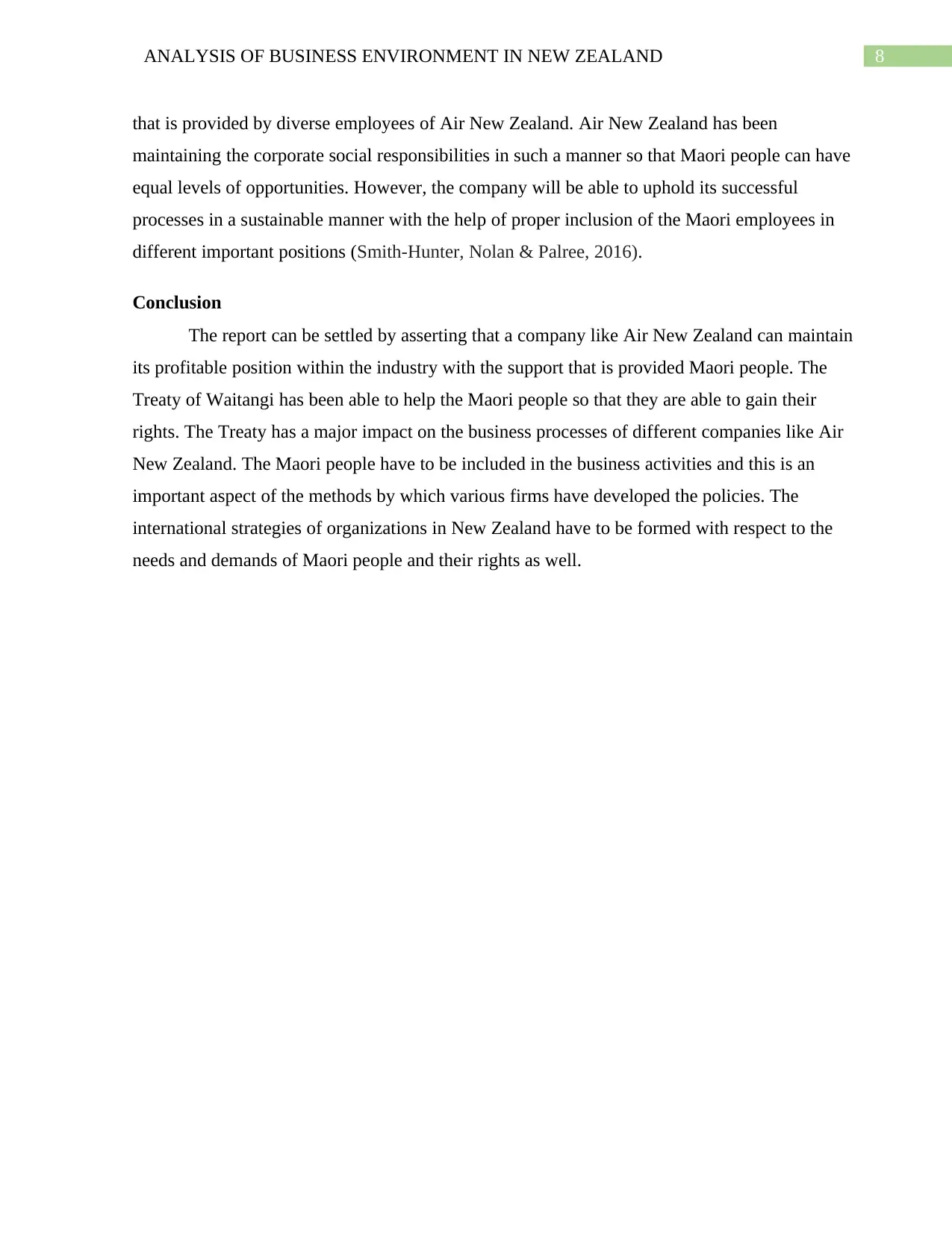
8ANALYSIS OF BUSINESS ENVIRONMENT IN NEW ZEALAND
that is provided by diverse employees of Air New Zealand. Air New Zealand has been
maintaining the corporate social responsibilities in such a manner so that Maori people can have
equal levels of opportunities. However, the company will be able to uphold its successful
processes in a sustainable manner with the help of proper inclusion of the Maori employees in
different important positions (Smith-Hunter, Nolan & Palree, 2016).
Conclusion
The report can be settled by asserting that a company like Air New Zealand can maintain
its profitable position within the industry with the support that is provided Maori people. The
Treaty of Waitangi has been able to help the Maori people so that they are able to gain their
rights. The Treaty has a major impact on the business processes of different companies like Air
New Zealand. The Maori people have to be included in the business activities and this is an
important aspect of the methods by which various firms have developed the policies. The
international strategies of organizations in New Zealand have to be formed with respect to the
needs and demands of Maori people and their rights as well.
that is provided by diverse employees of Air New Zealand. Air New Zealand has been
maintaining the corporate social responsibilities in such a manner so that Maori people can have
equal levels of opportunities. However, the company will be able to uphold its successful
processes in a sustainable manner with the help of proper inclusion of the Maori employees in
different important positions (Smith-Hunter, Nolan & Palree, 2016).
Conclusion
The report can be settled by asserting that a company like Air New Zealand can maintain
its profitable position within the industry with the support that is provided Maori people. The
Treaty of Waitangi has been able to help the Maori people so that they are able to gain their
rights. The Treaty has a major impact on the business processes of different companies like Air
New Zealand. The Maori people have to be included in the business activities and this is an
important aspect of the methods by which various firms have developed the policies. The
international strategies of organizations in New Zealand have to be formed with respect to the
needs and demands of Maori people and their rights as well.
⊘ This is a preview!⊘
Do you want full access?
Subscribe today to unlock all pages.

Trusted by 1+ million students worldwide
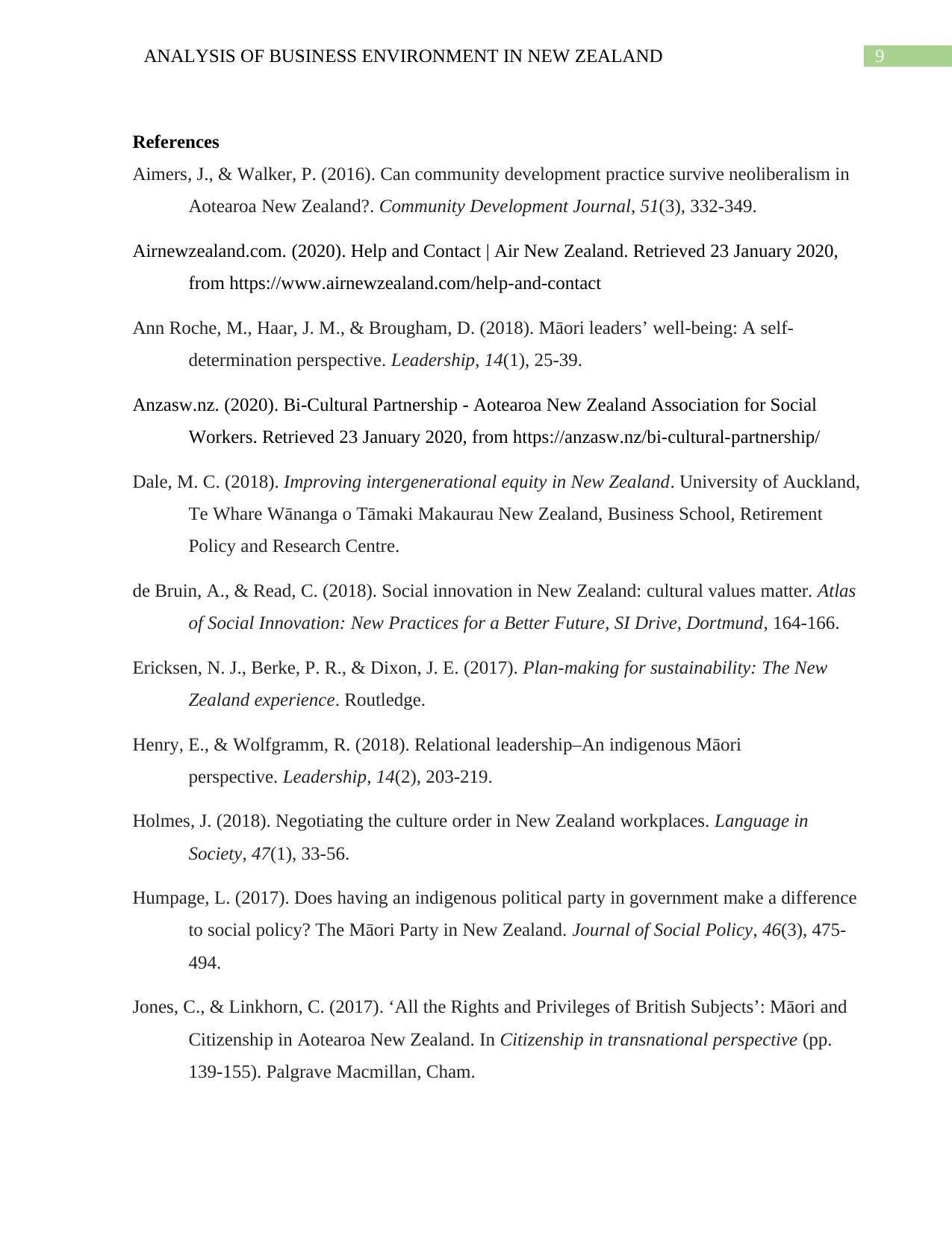
9ANALYSIS OF BUSINESS ENVIRONMENT IN NEW ZEALAND
References
Aimers, J., & Walker, P. (2016). Can community development practice survive neoliberalism in
Aotearoa New Zealand?. Community Development Journal, 51(3), 332-349.
Airnewzealand.com. (2020). Help and Contact | Air New Zealand. Retrieved 23 January 2020,
from https://www.airnewzealand.com/help-and-contact
Ann Roche, M., Haar, J. M., & Brougham, D. (2018). Māori leaders’ well-being: A self-
determination perspective. Leadership, 14(1), 25-39.
Anzasw.nz. (2020). Bi-Cultural Partnership - Aotearoa New Zealand Association for Social
Workers. Retrieved 23 January 2020, from https://anzasw.nz/bi-cultural-partnership/
Dale, M. C. (2018). Improving intergenerational equity in New Zealand. University of Auckland,
Te Whare Wānanga o Tāmaki Makaurau New Zealand, Business School, Retirement
Policy and Research Centre.
de Bruin, A., & Read, C. (2018). Social innovation in New Zealand: cultural values matter. Atlas
of Social Innovation: New Practices for a Better Future, SI Drive, Dortmund, 164-166.
Ericksen, N. J., Berke, P. R., & Dixon, J. E. (2017). Plan-making for sustainability: The New
Zealand experience. Routledge.
Henry, E., & Wolfgramm, R. (2018). Relational leadership–An indigenous Māori
perspective. Leadership, 14(2), 203-219.
Holmes, J. (2018). Negotiating the culture order in New Zealand workplaces. Language in
Society, 47(1), 33-56.
Humpage, L. (2017). Does having an indigenous political party in government make a difference
to social policy? The Māori Party in New Zealand. Journal of Social Policy, 46(3), 475-
494.
Jones, C., & Linkhorn, C. (2017). ‘All the Rights and Privileges of British Subjects’: Māori and
Citizenship in Aotearoa New Zealand. In Citizenship in transnational perspective (pp.
139-155). Palgrave Macmillan, Cham.
References
Aimers, J., & Walker, P. (2016). Can community development practice survive neoliberalism in
Aotearoa New Zealand?. Community Development Journal, 51(3), 332-349.
Airnewzealand.com. (2020). Help and Contact | Air New Zealand. Retrieved 23 January 2020,
from https://www.airnewzealand.com/help-and-contact
Ann Roche, M., Haar, J. M., & Brougham, D. (2018). Māori leaders’ well-being: A self-
determination perspective. Leadership, 14(1), 25-39.
Anzasw.nz. (2020). Bi-Cultural Partnership - Aotearoa New Zealand Association for Social
Workers. Retrieved 23 January 2020, from https://anzasw.nz/bi-cultural-partnership/
Dale, M. C. (2018). Improving intergenerational equity in New Zealand. University of Auckland,
Te Whare Wānanga o Tāmaki Makaurau New Zealand, Business School, Retirement
Policy and Research Centre.
de Bruin, A., & Read, C. (2018). Social innovation in New Zealand: cultural values matter. Atlas
of Social Innovation: New Practices for a Better Future, SI Drive, Dortmund, 164-166.
Ericksen, N. J., Berke, P. R., & Dixon, J. E. (2017). Plan-making for sustainability: The New
Zealand experience. Routledge.
Henry, E., & Wolfgramm, R. (2018). Relational leadership–An indigenous Māori
perspective. Leadership, 14(2), 203-219.
Holmes, J. (2018). Negotiating the culture order in New Zealand workplaces. Language in
Society, 47(1), 33-56.
Humpage, L. (2017). Does having an indigenous political party in government make a difference
to social policy? The Māori Party in New Zealand. Journal of Social Policy, 46(3), 475-
494.
Jones, C., & Linkhorn, C. (2017). ‘All the Rights and Privileges of British Subjects’: Māori and
Citizenship in Aotearoa New Zealand. In Citizenship in transnational perspective (pp.
139-155). Palgrave Macmillan, Cham.
Paraphrase This Document
Need a fresh take? Get an instant paraphrase of this document with our AI Paraphraser
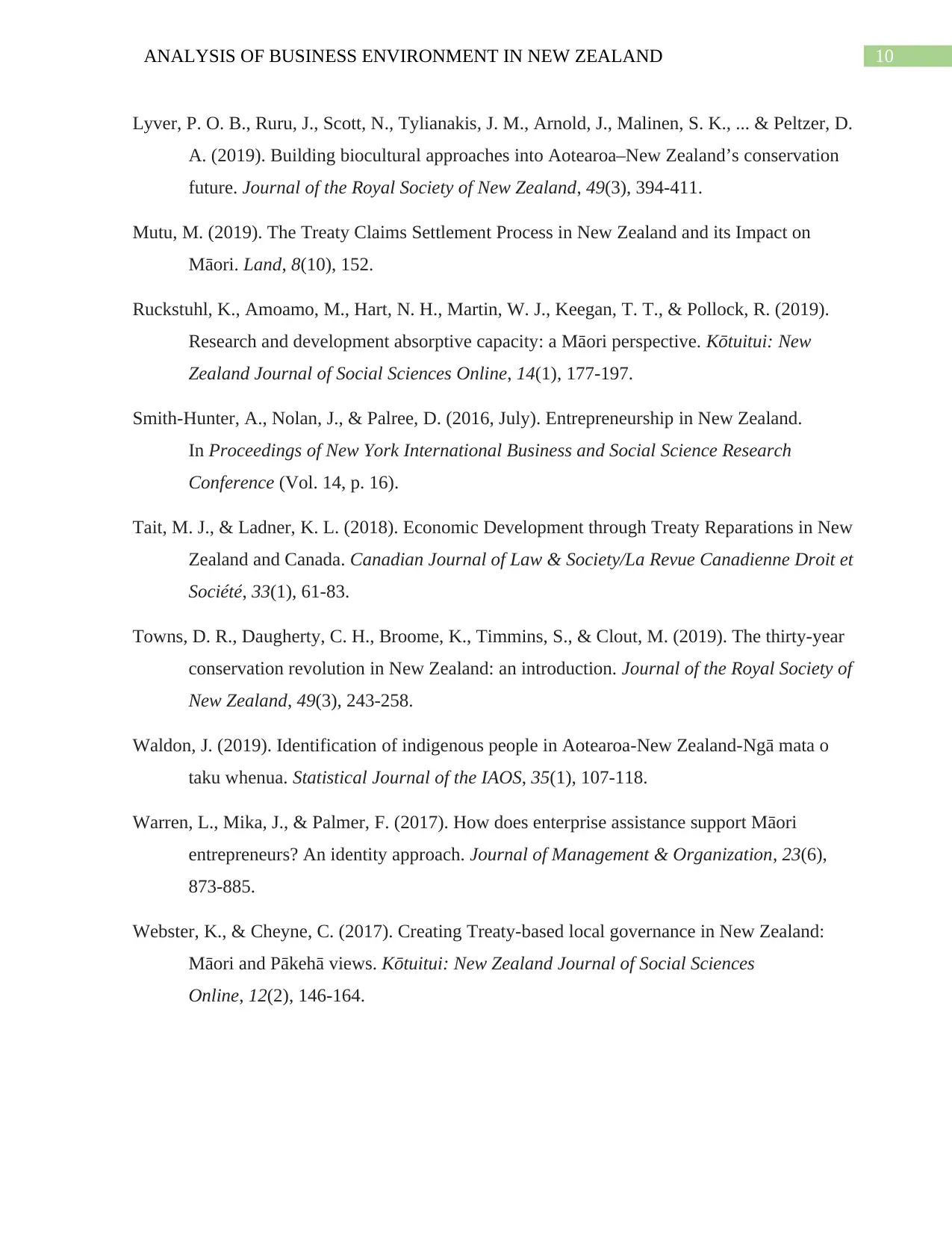
10ANALYSIS OF BUSINESS ENVIRONMENT IN NEW ZEALAND
Lyver, P. O. B., Ruru, J., Scott, N., Tylianakis, J. M., Arnold, J., Malinen, S. K., ... & Peltzer, D.
A. (2019). Building biocultural approaches into Aotearoa–New Zealand’s conservation
future. Journal of the Royal Society of New Zealand, 49(3), 394-411.
Mutu, M. (2019). The Treaty Claims Settlement Process in New Zealand and its Impact on
Māori. Land, 8(10), 152.
Ruckstuhl, K., Amoamo, M., Hart, N. H., Martin, W. J., Keegan, T. T., & Pollock, R. (2019).
Research and development absorptive capacity: a Māori perspective. Kōtuitui: New
Zealand Journal of Social Sciences Online, 14(1), 177-197.
Smith-Hunter, A., Nolan, J., & Palree, D. (2016, July). Entrepreneurship in New Zealand.
In Proceedings of New York International Business and Social Science Research
Conference (Vol. 14, p. 16).
Tait, M. J., & Ladner, K. L. (2018). Economic Development through Treaty Reparations in New
Zealand and Canada. Canadian Journal of Law & Society/La Revue Canadienne Droit et
Société, 33(1), 61-83.
Towns, D. R., Daugherty, C. H., Broome, K., Timmins, S., & Clout, M. (2019). The thirty-year
conservation revolution in New Zealand: an introduction. Journal of the Royal Society of
New Zealand, 49(3), 243-258.
Waldon, J. (2019). Identification of indigenous people in Aotearoa-New Zealand-Ngā mata o
taku whenua. Statistical Journal of the IAOS, 35(1), 107-118.
Warren, L., Mika, J., & Palmer, F. (2017). How does enterprise assistance support Māori
entrepreneurs? An identity approach. Journal of Management & Organization, 23(6),
873-885.
Webster, K., & Cheyne, C. (2017). Creating Treaty-based local governance in New Zealand:
Māori and Pākehā views. Kōtuitui: New Zealand Journal of Social Sciences
Online, 12(2), 146-164.
Lyver, P. O. B., Ruru, J., Scott, N., Tylianakis, J. M., Arnold, J., Malinen, S. K., ... & Peltzer, D.
A. (2019). Building biocultural approaches into Aotearoa–New Zealand’s conservation
future. Journal of the Royal Society of New Zealand, 49(3), 394-411.
Mutu, M. (2019). The Treaty Claims Settlement Process in New Zealand and its Impact on
Māori. Land, 8(10), 152.
Ruckstuhl, K., Amoamo, M., Hart, N. H., Martin, W. J., Keegan, T. T., & Pollock, R. (2019).
Research and development absorptive capacity: a Māori perspective. Kōtuitui: New
Zealand Journal of Social Sciences Online, 14(1), 177-197.
Smith-Hunter, A., Nolan, J., & Palree, D. (2016, July). Entrepreneurship in New Zealand.
In Proceedings of New York International Business and Social Science Research
Conference (Vol. 14, p. 16).
Tait, M. J., & Ladner, K. L. (2018). Economic Development through Treaty Reparations in New
Zealand and Canada. Canadian Journal of Law & Society/La Revue Canadienne Droit et
Société, 33(1), 61-83.
Towns, D. R., Daugherty, C. H., Broome, K., Timmins, S., & Clout, M. (2019). The thirty-year
conservation revolution in New Zealand: an introduction. Journal of the Royal Society of
New Zealand, 49(3), 243-258.
Waldon, J. (2019). Identification of indigenous people in Aotearoa-New Zealand-Ngā mata o
taku whenua. Statistical Journal of the IAOS, 35(1), 107-118.
Warren, L., Mika, J., & Palmer, F. (2017). How does enterprise assistance support Māori
entrepreneurs? An identity approach. Journal of Management & Organization, 23(6),
873-885.
Webster, K., & Cheyne, C. (2017). Creating Treaty-based local governance in New Zealand:
Māori and Pākehā views. Kōtuitui: New Zealand Journal of Social Sciences
Online, 12(2), 146-164.
1 out of 11
Related Documents
Your All-in-One AI-Powered Toolkit for Academic Success.
+13062052269
info@desklib.com
Available 24*7 on WhatsApp / Email
![[object Object]](/_next/static/media/star-bottom.7253800d.svg)
Unlock your academic potential
Copyright © 2020–2025 A2Z Services. All Rights Reserved. Developed and managed by ZUCOL.




